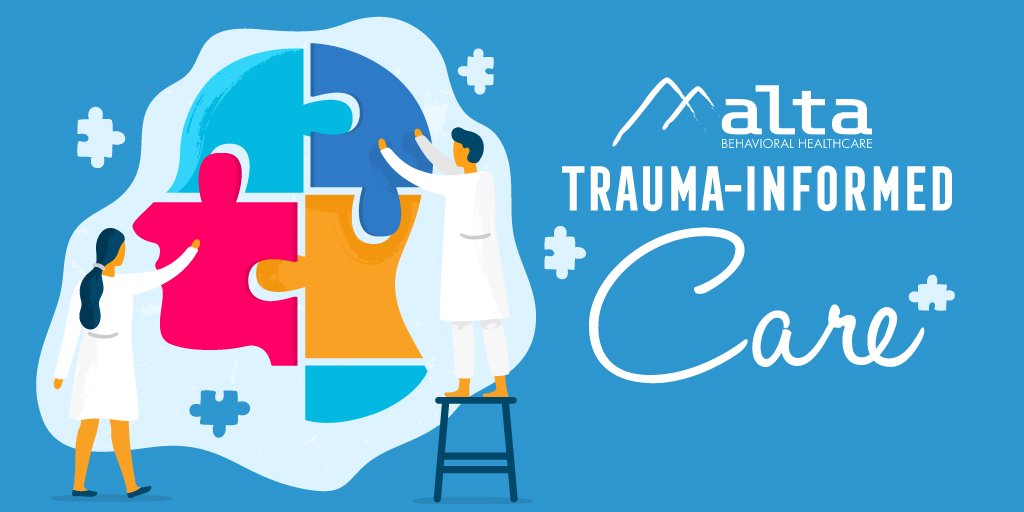What’s the Big Deal About Trauma-Informed Care?
At Alta Behavioral Healthcare, our entire staff is trained in Trauma-Informed Care (TIC). From our counselors to our maintenance staff, each and every person in our building and on our payroll receives the training necessary to recognize and address the dangers of trauma. But why? Why have we devoted so much time, effort and money into TIC training? Is it really that important?
What is trauma?
Trauma is, quite simply, a pervasive problem. Trauma occurs when someone is exposed to an incident or series of events that lead to emotional disturbance or the threatening of one’s life. This trauma can have a lasting negative effect on an individual’s functioning, as well as mental, emotional, physical, social and spiritual well-being.
Experiences that may be considered traumatic include:
• Physical, sexual and emotional abuse
• Childhood neglect
• Living with a family member with mental health or substance use disorders
• Sudden, unexplained separation from a loved one
• Poverty
• Racism, discrimination and oppression
• Violence in the community, war, or terrorism
• Many other things not mentioned
How prevalent is trauma?
The sobering truth and harsh reality is that trauma is all around us. Over the past decade, an increase in research has drawn national attention to the significance of trauma, and the statistics are quite shocking. The Centers for Disease Control and Prevention (CDC) reports that one in four children experience some sort of maltreatment (physical, sexual or emotional abuse). In addition, one in four women have experienced domestic violence in some form. Further, one in five women and one in 71 men have experienced rape – 12% of these women and 30% of these men were younger than 10 years old when they were raped. The reality is that trauma is affecting more people in the United States than we ever realized. Now that we as a nation have recognized how serious and wide-spread this problem is, it’s time to start doing something about it.
What is Trauma-Informed Care?
Trauma-Informed Care recognizes the impact of trauma and understands that there are different paths to recovery. TIC teaches the signs and symptoms of trauma so that TIC-trained people can recognize trauma in patients, families or children. One can then implement that knowledge of trauma into policies, procedures and best practices to create an environment that promotes healing and acceptance. Lastly, TIC also teaches how to actively avoid re-traumatization. Ultimately, TIC shifts the focus from “What’s wrong with you?” to “What happened to you?” Understanding that life experiences are often at the root of poor physical or mental health is essential to improving the well-being of patients.
Why is Trauma-Informed Care needed?
TIC is needed because the effects of trauma are real and they are serious. According to Adverse Childhood Experiences (ACE) study, people who experience trauma are:
• 2 times more likely to smoke
• 2.5 times more likely to have sexually-transmitted infections
• 4 times more likely to have chronic obstructive pulmonary disease
• 7 times more likely to consider themselves an alcoholic
• 10 times more likely to have injected street drugs
• 12 times more likely to have attempted suicide
Not only that, repeated exposure to trauma can impact the brain development of a child. Trauma at a young age can literally rewire the brain’s response to stress. In turn, when these trauma survivors grow up, many struggle with issues related to emotional regulation.
What is Alta Behavioral Healthcare doing about this?
As the statistics have come pouring in regarding the reality of trauma in the United States, we at Alta refused to sit on our hands and watch this go by. That is why we mandate that our entire staff receive Trauma-Informed Care training. Since then, we have seen great results as our staff works with patients to understand, talk about and start healing from trauma that they have experienced. We know what a pivotal role past experience plays in current health, and the Alta staff is thoroughly equipped to work with and support anyone that comes through our doors.
For questions about Alta’s Trauma-Informed Care, or to speak an Alta representative, call 330-793-2487. You can also visit our website for more information about Alta Behavioral Healthcare: https://altabehavioralhealthcare.org/.


